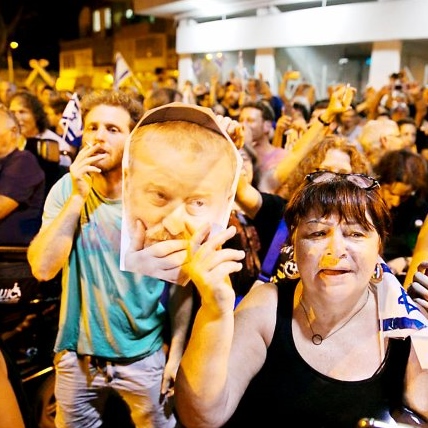
News

Netanyahu’s crown is toppling
PAULA SLIER
And each Saturday night, without fail, the security guards controlling the neighbourhood check our press credentials, becoming more wary and nervous as the weeks drag on.
The protests have sparked counter-demonstrations in support of the prime minister across the road and sometimes the furore between the two groups threatens to dissolve into chaos and confrontation.
For every protester who tells me Netanyahu is a thief, there is another on the opposite side of the street praising him and blaming the media for demonising him. As much as we are welcomed by the anti-Netanyahu crowd, we are hated by those who support him.
But the Saturday demonstrations are starting to get under the skin of the prime minister – and with good reason. They’re in reaction to a long-running corruption scandal against him and his wife, Sara, who will probably be indicted soon in a separate case.
Things recently got a whole lot worse for them after a former chief of staff signed a deal with the Israeli police to become a state witness in two criminal investigations in which the prime minister is a suspect. One involves receiving gifts from billionaires abroad; the other concerns an alleged attempt to negotiate favourable press coverage.
The final decision as to the fate of Netanyahu lies in the hands of Mandelblit, who no doubt is also getting fed up with the noise outside his Petah Tikva home.
Last week, Israel’s Supreme Court ruled no more than 500 people could attend the weekly protests, a far cry from the thousands who’ve been coming recently.
Loudspeakers have also been banned. When those speakers were allowed, they questioned – and noisily – the prime minister’s financial misdealings and illicit business ties.
The allegations have yet to threaten Netanyahu politically, although they’re having some impact. They’ve seen his approval ratings drop amid repeated questions over his conduct and integrity.
Netanyahu has repeatedly denied any wrongdoing and like his friend, US President Donald Trump, blames “the left and the media”. As he said: “We know that it’s the same thing… an unprecedented hunt against me and my family to bring down the government.”
This is a dangerous and slippery slope for the prime minister to embark upon. While he might be right that there is a sensationalist streak to some of the Israeli media’s coverage of what he and his family are doing, reputable journalists are asking fair questions about his business dealings that he should answer.
One case, for example, known as the “Submarine Affair”, involves allegations of bribery in a more than a billion dollar submarine deal between Israel and Germany. While the prime minister is not himself a suspect, his personal lawyer and cousin is.
Should Netanyahu ultimately be found guilty, he will lose his job and maybe even land up in prison. If this happens, he won’t be the first.
Ehud Olmert, also a former Israeli prime minister, was released from jail in July this year, having served 16 of a 27-month sentence for obstruction of justice, fraud, bribery and breach of trust.
Moshe Katsav, a former Israeli president, was imprisoned for five years for rape.
The list of government ministers and mayors who’ve served time for crimes they carried out while in office, makes for sober reading. It also explains why many of the Saturday night protesters say they’re demonstrating not only against Netanyahu, but against the much bigger problem of corruption among Israeli leaders.
If Netanyahu was to end up behind bars, it would be a sad ending for the second longest-serving prime minister in Israel’s history, after its founder, David Ben-Gurion. However, it would definitely speak to the strong Israeli democracy and judicial system.
Most analysts, though, agree that Netanyahu’s tenure is far from over. This is not the first time he has found himself embroiled in such scandals and he’s escaped them before.
He has the backing of his ruling Likud Party and key conservative coalition partners – at least for now. Even among those who want him gone – and there are plenty – there is a reluctant acknowledgement that he has no visible successor.
There is an understanding that ousting him would throw the country into a leadership vacuum, which no-one, regardless of where on the political spectrum they stand, really wants.
But be fair, however, the latest accusations do seem the most serious he’s faced to date. His supporters charge that the Israeli opposition has no real political alternatives to offer and are therefore piggybacking on the police investigations.
Newspaper editorials support the claims, suggesting Netanyahu’s critics should be clamping down on his policies and not jumping up and down over stories that his wife allegedly used state funds to by ice cream, makeup and the like.
Still, with charges of bribery and fraud looming, the “King of Israel”, as Time magazine once called him, is looking vulnerable and no doubt wishes the whole affair would go away.
Paula Slier is the Middle East Bureau Chief of RT, the founder and CEO of NewshoundMedia and the inaugural winner of the Europcar Woman in Leadership Award of the South African Absa Jewish Achievers.




